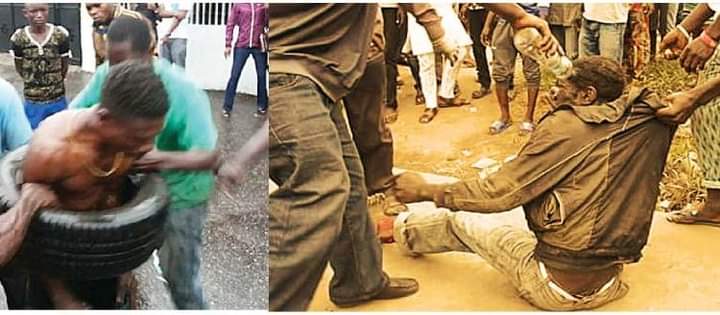
Concerns over rising cases of mob action
A wave of mob killings which has swept through the country in recent times has become a source of worry for well-meaning citizens even as experts propose remedies to the menace, KUNLE AKINRINADE reports.
The rustic ambience of Umuawom village in Ikeduru Local Government Area of Imo State hosted a gory scene as villagers assumed the roles of the accuser, the judge and executioner. Some of the community’s residents pounced on a fleeing prisoner and set him ablaze.
As the story goes, the unnamed man was among the inmates that escaped from a correctional centre in Owerri, Imo State capital on Monday, April 5, when some gunmen attacked the correctional centre and set the inmates free.
The fleeing inmate was said to have been remanded in custody for more than one year over his alleged involvement in kidnapping and other crimes until he escaped on April5. But while some other escapees voluntarily returned to custody, the unidentified inmate went straight to one of the families that testified against him and threatened to deal with the members.
To make good his threat, he was said to have attempted to attack a member of the family with a gun. But the move cost him his life as a mob made up of the community’s residents promptly seized him and set him ablaze.
In Lagos, a suspected burglar was given jungle justice in the Ikotun suburb of the city on April9. The police said the suspect had attempted to rob one Mrs. Adeyemi Opeyemi when he was intercepted by residents and lynched.
“The alleged burglar was said to have gained entry into Opeyemi’s room at No 2, Asalu Bus Stop, off Abaranje Road, Ikotun in an attempt to rob her, but she raised the alarm and the burglar (suspect) escaped into the street where some members of the community apprehended and beat him to death,” police spokesman Olumuyiwa Adejobi said in a statement.
Barely three days after, three suspected bandits were killed by a mob in Magamar Jibia town in Jibia Local Government Area of Katsina State.
The incident occurred at about 11:25 pm when the unidentified gunmen invaded the community on Sunday April 11 and entered the residence of an unidentified villager, who raised the alarm.
The alarm attracted the residents who quickly mobilised and confronted the suspected bandits
“I saw the corpses of two of the suspected bandits burnt beyond recognition and dumped at the Magama junction, but the third person, who was said to be in army uniform, was said to have been taken away by policemen,” a resident reportedly said.
In the heart of Lagos Island, precisely at Sura area of Tapa, irate residents caught two suspected kidnappers on December 16, 2020 and set them ablaze.
The two suspects were said to have broken into the apartment of one Mrs. Makanjuola at Freeman Street and attempted to kidnap her baby. The suspects allegedly bolted when they sensed danger, but a mob caught up with them a few metres away and killed one of them.
It however turned out that one of the suspects was a policeman attached to a nearby police division in the neighbourhood.
Arrest of jungle judges
A number of arrests has been made lately by police authorities in Lagos to curb the growing trend of lynching. For example, three community leaders were recently arrested on the orders of the Lagos State Commissioner of Police, Hakeem Odumosu. The police accused the community leaders of complicity in the killing of the suspected burglar in the Ikotun area of Lagos.
The Police spokesperson in the state, Olumuyiwa Adejobi, said in a statement that the community leaders were held for questioning on the role they played in the killing of the suspected burglar. According to him, “the burglar had allegedly gained entry into the room of Mrs. Opeyemi of No 2, Asalu Bus Stop, off Abaranje Road, Ikotun in an attempt to rob her, but she raised the alarm and the burglar escaped into the street, where some members of the community apprehended and beat him to death.”
Adejobi added: “The Commissioner of Police, Lagos State, CP Hakeem Odumosu, has condemned the act of jungle justice meted out to the suspect.
“He has vowed to kick against such as it is becoming rampant and such is inimical to our collective efforts to improve on the criminal justice system of Lagos State.”
In the same vein, the killing of a suspected kidnapper on Lagos Island resulted in the arrest of the purported victim, Mrs. Munirat Makanjuola, by operatives of the Lagos State Police Command. Makanjuola was, however, released two months after, following a no-case submission made by the Directorate of Public Prosecution (DPP).
Similarly, no fewer than 30 persons were arrested in 2017 for their alleged involvement in the lynching of some suspected ritual killers on the Lagos-Abeokuta Expressway.
Parading the suspects, the then Commissioner of Police in Lagos State, Mr. Fatai Owoseni, said the mob also injured some policemen who tried to prevent them from carrying out the act.
Owoseni said: “We want to use this opportunity to warn that the police and other security agencies will not fold their arms and watch people carry out jungle justice on people who may be innocent.
“We want to passionately appeal to the public to report any suspicious place they know as hideouts of suspected ritualists or kidnappers to the police.”
Why citizens engage in mob action
Chief among the factors responsible for recourse to lynching by people is lack of trust in the police to effect the arrest and prosecution of suspected criminals in several neighbourhoods and townships across the country.
The development, according to a security expert, Pius Nwoko, is ”the main reason irate crowds visit jungle justice on suspected criminals in many Nigerian communities.”
Nwoko added: ”You will often come across cases where suspects apprehended for robbery, kidnapping and rape, among others, regain their freedom shortly after they were whisked to police stations, and many of these criminals would return to perpetrate heinous crimes.
“This accounts for why they are lynched by mobs when they are caught again, to forestall their release from police custody.”
Nwoko said further that lack of adequate protection amid perennial insecurity in the country also fuels mob actions.
He said: “A lot of people are frustrated with the inadequate protection or dysfunctional policing which leaves them at the mercy of criminals.
“For example, the response by the police to distress calls when robbers or kidnappers strike is most times very slow or not forthcoming at all. This is the reason people take the law into their hands, killing suspects with the police not in sight when required.”
A community leader in Agege, Lagos, Chief Adeniran Olalere, hinged lynching and other mob actions on the perceived corrupt justice administration system in the country.
He said: ”Jungle justice does not just happen. It has become an avenue for people to ventilate their anger against corrupt law and justice officers who usually set criminals free after collecting bribes.
“We have seen several instances when arrested suspects boast to their victims that they would be set free at the police station or at the court, and it happened exactly that way because they were able to bribe their way to freedom.
“So, mob action against criminals may not be the best way of ensuring justice, but it is a sad commentary on our justice administration system in this country.”
In his opinion. A resident of Lagos Island, Prince Adeolu Taiwo, said the circumvention of justice by minions of law is the architect of lynching.
He said: ”Mob attack or lynching is a direct response to the prevalence of circumvention of justice by law enforcement operatives in the country.
”In the case of the Lagos Island killing of a suspected kidnapper, the second suspect is yet to be prosecuted till today in spite of his confessions while their victim was held in custody for several weeks until she was freed on the DPP’s advice.
“When people are not assured of getting justice when they are victims of crime, they help themselves by lynching suspected criminals, albeit such jungle justice is against the doctrine of fairness in justice administration.”
He added: ”Mob killing is nothing but an act of injustice. However, injustice will always create a cycle of injustice so long as those who deserve redress for being victims of crimes are abandoned and their oppressors are set free and would even mock their victims.”
Wrongful killings
Apart from its implication for rule of law as an uncivilised way of administering justice which rob victims of fair trial, mob actions have led to wrong killings in recent times.
It will be recalled that four young men popularly called the Aluu 4, namely Ugonna Obuzor, Toku Lloyd, Chiadika Biringa and Tekena Elkanah, all undergraduates of the University of Port Harcourt, were lynched after they were falsely accused of stealing a blackberry phone and a computer laptop in Aluu, a community in Ikwerre Local Government Area, Rivers State on October 5, 2012.
The students had allegedly gone to Aluu community in search of a debtor to one of them at night when the debtor named Bright allegedly raised the alarm and called them thieves who had come to steal his computer laptop and other valuables.
The alarm caught the attention of the local vigilante members who pursued the deceased students, mercilessly beat them up and eventually set them ablaze.
The viral video of the gruesome killing led to the arrest of several suspects who were also arraigned in court.
Five years after the incident, a Rivers State High Court sentenced to death a Police Sergeant, Mr. Lucky Orji, David Chinasa Ogbada and Ikechukwu Louis Amadi, (aka Kapoon) for their roles in the murder of the four students.
The presiding judge, Justice Letam Nyordee, said a video of the killing, which went viral on the internet shortly after the four students were burnt, convincingly proved the extent of involvement of the three convicted over the gruesome murder.
Experts suggest solutions
Condemning the act of lynching people on the basis of suspicion, a legal practitioner, Sylvester Odinaka, noted that such action belittles the criminal justice administration system of the country.
He suggested proactive policing and diligent prosecution of suspects as remedies.
Odin’s said: “It is absurd that mob lynching is still being practised in Nigeria in the 21st Century. It is condemnable that people are gruesomely killed on mere suspicion or just because some persons raised the alarm on the presence or action of some persons.
”In law, suspects are presumed innocent until proven guilty by a court of competent jurisdiction, and this simply means that no matter the level of suspicion or weighty allegations against the suspect, only a court of law can determine their culpability and appropriate sanctions or punishment for their crimes.
“However, the remedy to this sad development is for the authorities to put in place measures that would ensure diligent policing to forestall mob attack and prosecution of offenders to boost public confidence in law enforcement agents and guarantee justice for both suspects and victims of crimes.
“I make this submission because a number of times, cases against criminals are struck out by courts for want of diligent prosecution on the part of police and unnecessary delays arising from a wrong arraignment in courts lacking jurisdiction to entertain certain criminal cases, want of evidence including witnesses and, at times, absence of police prosecutors in court.”
In his view, a police reform advocate and retired senior officer, Oladeinde Oladosu, called for urgent steps to curb the menace of mob killings.
He said: ”Lynching is nothing but a self-help approach to justice, usually rash, emotional, and without tact, leading to the killing of innocent persons in most cases.
”Quite a number of people have been gruesomely killed by mobs in recent times to the chagrin of the international community, and this is one of the reasons Nigeria’s rating on the report by organisations such as Amnesty International has continued to be perennially poor.
“The way out is confidence building in people by our police and judicial authorities.
‘’Remedies such as police reforms that could guarantee efficient crime prevention, modern investigative skills for detectives and thorough prosecution of suspects can guarantee public confidence in the police and justice system and by extension curb the menace of lynching in Nigeria.”












